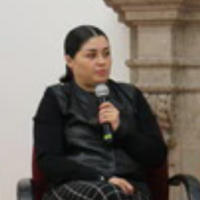Women and Work: The Impact of Gender-Based Violence
An event summary will be available soon.
This event is part of a Wilson Center series held in recognition of the 16 Days of Activism against Gender-Based Violence (November 25 – December 10, 2020), an international campaign to build awareness and galvanize action in the fight against violence against women and girls.
Speaker Quotes
Laura McDonald:
“It’s important to recognize that violence against women in Latin America, which has been a subject of enormous attention in the last few years, is not confined to the domestic realm, but permeates every aspect of women’s lives […] We often talk about the private and public sphere in efforts to address violence against women—often focused on the so-called private sphere of the household—and ignore the role that employers or fellow workers might play in perpetrating violence against women.”
“Between 60 and 76 percent of women—around two out of every three—have been the victim of gender-based violence in distinct areas of their lives.”
“Currently in Latin America and the Caribbean more than 100 million women, some 50 percent of the working age population, are part of the labor force. That’s a huge increase in recent years.”
“The most recurrent forms of violence and harassment in the workplace in the Americas are dismissal and harassment for organizing, preventing someone from going to the doctor or caring for a family member, or creating difficulty for women who are pregnant or breastfeeding. There are wage gaps as well as physical aggressions, confinement, unwanted advances, intimidation and sexual abuse, sometimes resulting in unwanted pregnancies […] In addition, workers are sometimes subject to bullying for various reasons, including on grounds of their sexual orientation, race, or even age”
“According to data from Mexican labor authorities, three out of every four women are harassed. One of those victims is fired, and four out of ten victims quit.”
“The conditions in which [women] travel to and from work often subject them to new forms of abuses. Crowded buses and subway trains are rife with forms of abuse. Mexico City was shown to be the most dangerous transport system for women out of five of the world’s biggest commuter cities […] About three of every four women polled in Mexico city said they were afraid of using the public transport systems because of the risk of harassment and abuse that they would confront there.”
Monica Salazar
“The adoption of international human rights instruments has protected human rights and reflected consensus in the region when we talk about harassment [and] also, sexual violence; but when we talk about labor rights, that’s a very different perspective, and also a very different approach. Somehow, we haven’t been able to address, properly, both things.”
“Regarding the relationship between gender-based violence and discrimination in workplaces, it indicates that violence of this kind is a reflection of historical, unequal power relationships between women and men, which is still a huge problem in the region.”
“Accountability for gender equality achievement is still insufficient, but also we are facing a huge problem of funding […] a gender-equality agenda in the region. Domestic resources, as well as international ones, have been gradually reduced.
“Most of the perspectives addressing bad labor conditions have come from other parts of the world, with very different contexts, but also with very different social considerations and political differences. So when we try to implement different policies […] in the Latin American context, they don't match.”
Rana Husseini
“One of the main reasons for women to leave [work] is because once she delivers, most employers will either not have her back, or it starts with they will not hire women who are married or ones who just got married. And this is a form of violence for me. It’s violence before the woman even starts to try, to know if she’s going to get pregnant or if she gets married […] There are all kinds of stories we hear about that. So [a group of young mothers] were fighting to change the laws to include nurseries at workplaces. And they did succeed. And this took them almost ten years to work on something like this. This way women do not have to leave the job early—they can advance at work. Because this is another form of violence. Women have to leave, and then they cannot advance. Even if they return.”
“Many women in our part of the world, instead of going through the sexual harassment [reporting process] and being exposed and having her family know she was subjected to sexual harassment, she prefers just to walk away and leave the job, rather than stay and receive unfair treatment.”
“The women’s movement also tried very hard to eliminate sexual harassment at work. Unfortunately, this move was met with resistance from conservative and Islaamist deputies when the law was discussed in parliament. And you know, their concern was, they don’t want the term ‘sexual harassment’, they don’t want to have it in the legal textbooks. The good thing is [this issue was discussed], so sexual harassment became something known. Even if they don’t want to include it or if they don’t want to incriminate it, at least now this term is more known and more women know they could be subjected to sexual harassment.”
“You have to have a long breath to change things. And you have to lobby the government [at] the right time and in a very smart and strategic way. Unfortunately, rights are not given. You always have to fight for rights, you always have to extract rights. I think the thing that worked here [in Jordan] is that there are a lot of movements… it [takes] a lot of time, dedication, persistence. Things will change but it will take time.”
Ritu Dewan
“When I talk about gender issues and I teach, the first thing I ask is ‘What’s the opposite of patriarchy?’ And a whole lot of students reply ‘matriarchy,’ and I say ‘no, the opposite is equality.’”
“India has one of the lowest work participation rates of women, and it’s something which has steadily been declining. In fact, it’s one of the three countries in the world where the workforce participation of women has been declining. And you know, the latest figures were out just about two weeks ago and it’s only 14 percent of urban women who work.”
“Where India is concerned—and this happens much more in India than it does in Bangladesh of Pakistan of Nepal—and that is the violence at work against women. And many studies which we have done, say, among garment workers—which is an industry which is common to five or six or seven of our neighboring countries including Sri Lanka—[show] that a minimum of one in seven garment workers has been raped by the employer.
“What we found is that of course there is reporting of cases of violence against women at work, but 70 percent goes unreported. That is what our studies have shown. And even those that are reported, there are no police cases filed. Often it takes about six months or one year to get a police case filed and by that time, all the medical evidence, of course, is just gone.”
“I don’t want to romanticize the past, but certainly what I think is happening in the present is something which is what I call a process of de-equalization of gender. You know, whatever few rights one had achieved in terms of employment, in terms of facilities at work, in terms of safety at work—those are now legally taken away […]. A whole lot of laws are being passed which go against work, which go against women, and which impact very significantly the issue of violence and work […]. Creches [daycare] have been removed as part of the conditions of work, toilets have been removed as a part of the conditions of work, and these are very problematic issues where women are concerned.”
“There is also, of course, the calculation of minimum wages, which has been changed totally so a man is one full unit and a woman is 80 [percent] of a male unit—you know, presuming that she works less and she consumes less, and she needs to be given less."
“What we are facing in the last few years is a huge expansion of violence and a lot of the expansion of this violence—a normalization of violence, the internalization of violence—a lot of it comes from the top and it also has to do with your current political dispensation and the political dominant ideology which exists and when I say political, it’s political economy.”
Speakers




Moderator

Hosted By

Brazil Institute
The Brazil Institute—the only country-specific policy institution focused on Brazil in Washington—aims to deepen understanding of Brazil’s complex landscape and strengthen relations between Brazilian and US institutions across all sectors. Read more


Latin America Program
The Wilson Center’s prestigious Latin America Program provides non-partisan expertise to a broad community of decision makers in the United States and Latin America on critical policy issues facing the Hemisphere. The Program provides insightful and actionable research for policymakers, private sector leaders, journalists, and public intellectuals in the United States and Latin America. To bridge the gap between scholarship and policy action, it fosters new inquiry, sponsors high-level public and private meetings among multiple stakeholders, and explores policy options to improve outcomes for citizens throughout the Americas. Drawing on the Wilson Center’s strength as the nation’s key non-partisan policy forum, the Program serves as a trusted source of analysis and a vital point of contact between the worlds of scholarship and action. Read more


Mexico Institute
The Mexico Institute seeks to improve understanding, communication, and cooperation between Mexico and the United States by promoting original research, encouraging public discussion, and proposing policy options for enhancing the bilateral relationship. A binational Advisory Board, chaired by Luis Téllez and Earl Anthony Wayne, oversees the work of the Mexico Institute. Read more


Middle East Program
The Wilson Center’s Middle East Program serves as a crucial resource for the policymaking community and beyond, providing analyses and research that helps inform US foreign policymaking, stimulates public debate, and expands knowledge about issues in the wider Middle East and North Africa (MENA) region. Read more


Kennan Institute
After more than 50 years as a vital part of the Wilson Center legacy, the Kennan Institute has become an independent think tank. You can find the current website for the Kennan Institute at kennaninstitute.org. Please look for future announcements about partnership activities between the Wilson Center and the Kennan Institute at Wilson Center Press Room. The Kennan Institute is the premier US center for advanced research on Eurasia and the oldest and largest regional program at the Woodrow Wilson International Center for Scholars. The Kennan Institute is committed to improving American understanding of Russia, Ukraine, Central Asia, the South Caucasus, and the surrounding region through research and exchange. Read more


Maternal Health Initiative
Housed within the Wilson Center's Environmental Change and Security Program, the Maternal Health Initiative (MHI) leads the Wilson Center’s work on maternal health, global health equity, and gender equality. Read more


